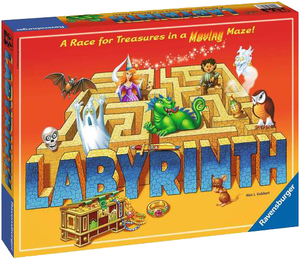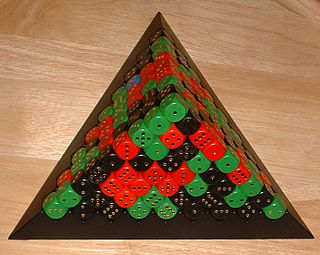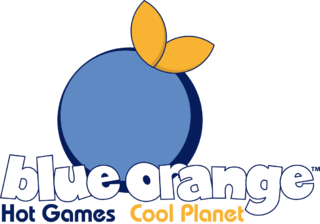
The Spiel des Jahres is an award for board and card games, created in 1978 with the purpose of rewarding family-friendly game design, and promoting excellent games in the German market. It is thought that the existence and popularity of the award was one of the major drivers of the quality of games coming out of Germany, particularly in the 1980s and 1990s. A Spiel des Jahres nomination can increase the typical sales of a game from 500–3,000 copies to around 10,000, and the winner can usually expect to sell as many as 500,000 copies.

Reiner Knizia is a prolific German-style board game designer. He was born in West Germany in 1957 and earned a doctorate in Mathematics from the University of Ulm before designing games full time. He is frequently included on lists of the greatest game designers of all time. Many of his hundreds of designs are considered modern classics, and many have won or been nominated for significant gaming awards, including the Spiel des Jahres and the Deutscher Spiele Preis. His notable designs include Amun-Re, Blue Moon City, Ingenious, Keltis, Lord of the Rings, Medici, Modern Art, Ra, Taj Mahal, Tigris and Euphrates, and Through the Desert. Many of his designs incorporate mathematical principles, such as his repeated use of auction mechanics.

El Grande is a German-style board game for 2-5 players, designed by Wolfgang Kramer and Richard Ulrich, and published in 1995 by Hans im Glück in German, by Rio Grande Games in English, and by 999 Games in Dutch. The game board represents renaissance-era Spain where the nobility fight for control of the nine regions. El Grande was praised for its area-control mechanism, and was awarded the Spiel des Jahres prize and the Deutscher Spiele Preis in 1996. Following its release, several expansions and an alternative version were published.

Days of Wonder is a board game publisher founded in 2002 and owned by Asmodee Group since 2014. Days of Wonder distributes its games to 25 countries. It specializes in German-style board games and has branched out to include some online games. Days of Wonder has published games in several languages including English, Dutch, French, German, Russian, and Greek. Days of Wonder was co-founded by Eric Hautemont, Mark Kaufmann and Yann Corno.

Wolfgang Kramer is a German board game designer.

Labyrinth is a board game for two to four players, published by Ravensburger in 1986.

Queen Games is a German publisher of tabletop games, based in Troisdorf and founded in 1992 by head Rajive Gupta, which specialises primarily in German-style, family-level games but has also published smaller numbers of both simpler, children's games and more complex, gamers' games.

Caylus is a strategy oriented, German-style board game designed by William Attia and independently published in 2005 by Ystari in France and England, and Rio Grande Games in North America. Caylus has a mix of building, producing, planning, and bargaining — without direct conflict or dice-rolling mechanics.

Niagara is a German-style board game designed by Thomas Liesching and published in 2004 by Zoch Verlag and Rio Grande Games. In Niagara, which is set in the Niagara Falls, players collect, transport, and steal gems. Upon its release, the game won several awards, including the 2005 Spiel des Jahres.

The Game is a dice game designed by Reinhold Wittig. It was first published in Germany in 1979, without rules and under the German name Das Spiel.
Diamant is a multiplayer card game designed by Alan R. Moon and Bruno Faidutti, published in 2005 in Germany by Schmidt Spiele, with illustrations provided by Jörg Asselborn, Christof Tisch, and Claus Stephan.

Agricola is a Euro-style board game created by Uwe Rosenberg. It is a worker placement game with a focus on resource management. In Agricola, players are farmers who sow, plow the fields, collect wood, build stables, buy animals, expand their farms and feed their families. After 14 rounds players calculate their score based on the size and prosperity of the household.

Qwirkle is a tile-based game for two to four players, designed by Susan McKinley Ross and published by MindWare in 2006. Qwirkle shares some characteristics with the games Rummikub and Scrabble. It is distributed in Canada by game and puzzle company Outset Media. Qwirkle is considered by MindWare to be its most awarded game of all time. In 2011, Qwirkle won the Spiel des Jahres. A sequel, Qwirkle Cubes, was released by Mindware in 2009.

Camel Up is a board game for two to eight players. It was designed by Steffen Bogen and illustrated by Dennis Lohausen, and published in 2014 by Pegasus Spiele. Players place bets on a camel race in the desert; the player who wins the most money is the winner of the game. Camel Up won the Spiel des Jahres in 2014.

Concept is a deduction party board game released in 2013. The game was designed by Alain Rivollet and Gaëtan Beaujannot and published by Repos Production. It has collected multiple awards and nominations including the Jeu de l'Année prize in Cannes in 2014.

Blue Orange is a French board game company based in Pont-à-Mousson, France. The company is often called Blue Orange international or Blue Orange Europe and mistaken for Blue Orange Games.
This page lists board and card games, wargames, miniatures games, and tabletop role-playing games published in 2019. For video games, see 2019 in video gaming.

XCOM: The Board Game is a 2015 science-fiction themed cooperative board game, set in the XCOM universe, published by Fantasy Flight Games and designed by Eric M. Lang.
Cockroach Poker is a bluffing card game designed by Jacques Zeimet and published in 2004 by Drei Magier Spiele. Players pass around cards and try to avoid getting too many of the same type by deceiving other players about the cards's identities. The game was the first in Drei Magier Speile's Ugly Animals card game series. In 2012, the spin-off Cockroach Poker Royal was released.















